Afghan cuisine
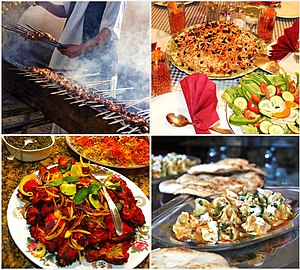
This article may require copy editing for grammar, style, cohesion, tone, or spelling. (June 2021) |
Afghan cuisine (Dari: آشپزی افغانستان, Pashto: افغان پخلی) is largely based upon the nation's main crops such as wheat, maize, barley and rice. Accompanying these staples are native fruits, vegetables, and dairy products such as milk, yogurt, and whey.[1] The nation's culinary specialties reflect its ethnic and geographic diversity. Afghanistan is known for its high-quality pomegranates, grapes, and sweet rugby-football-shaped melons.[2] The national dish of Afghanistan is Kabuli palaw.[3]
Major foods[]
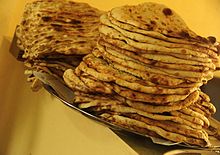


Types of rice dishes[]
Challow is served mainly with qormas (korma; stews or casseroles).
Palaw[]
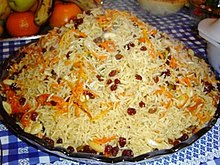
Palaw is cooked similarly to challow, but a combination of meat, stock, qorma, and herbs are also mixed together before the baking process. This creates the elaborate colors, flavors, and aromas over which the rice is named. Sometimes caramelized sugar is used to give the rice a rich brown color as well. Examples of palaw include:
- Kabuli Palaw – a national dish.[3] Meat and stock are added, and topped with the fried raisins, slivered carrots, and pistachios.
- Yakhni Palaw – meat and stock are added, rice has a brown color.
- Zamarod Palaw – spinach qorma mixed in before the baking process, hence 'Camaro' or emerald.
- Bore Palaw – Lawand is added which gives rice a yellow color.
- Landi Palaw – among other things , rice with stock made from chicken or mutton that has been salted and rested in the sun is a very traditional meal in Afghanistan.
- Bojan-e-Roomi Palaw – Bonjan-e-Roomi (tomato qorma) is added during baking, which creates red rice.
- Serkah Palaw – similar to yakhni pulao, but with vinegar and other spices.
- Shibet Palaw – fresh dill and raisins are added during baking.
- Narenj Palaw – a sweet, elaborate rice dish made with saffron, orange peel, pistachios, almonds, and chicken.
- Maash Palaw – a sweet and sour pulao baked with mung beans, apricots, and bulgur wheat. Exclusively vegetarian.
- Alou Balou Palaw- a sweet rice dish with plums and chicken.
Qormah[]
Qormah/Korma is a stew or casserole, usually served with chateau rice.[1] It is always based on onions and tomatoes. First, the onion is caramelized, creating a richly colored stew. Then the tomato is added, and a variety of fruits, spices, and vegetables depending on the recipe. The main ingredient is added last, which can be meat or other vegetables. There are hundreds of different types of qormahs; some examples include:
- Qormah e Gosht – translates to meat qormah, it usually is the main qormah served with Palaw at the gatherings.
- Qormah e Alou-Bokhara wa Dalnakhod – onion-based with sour plums, lentils, and cardamom. It uses veal or chicken.
- Qormah e Nadroo – onion-based with yogurt, lotus roots, cilantro, and coriander. It uses lamb meat or veal.
- Qormah e Lawand – onion-based with yogurt, turmeric, and cilantro. It uses chicken, lamb or beef.
- Qormah e Sabzi – sautéed spinach and other greens with lamb.
- Qormah e Shalgham – onion-based with turnips and sugar; sweet and sour taste. It uses lamb.
Mantu[]

Known under the name 'khameerbob' and often eaten as dumplings, these native dishes are popular. Due to the long time required to make dough for the dumplings, they are rarely served at large gatherings like weddings, instead, they are rather served at special occasions, e.g. at home:[citation needed]
- Mantu – Dumplings filled with onion and ground beef or lamb. Mantu is steamed and usually topped with a tomato-based sauce and yogurt- or qoroot-based sauce. The yogurt-based topping is usually a mixture of yogurt, garlic, and split chickpeas. The qoroot-based sauce is made of goat's cheese and is also mixed with garlic; a qoroot and yogurt mixture will sometimes be used. The dish is then topped with dried mint and coriander.
- Ashak – Dumplings filled with a mixture largely of leeks. Ashak is topped with garlic-mint qoroot or a garlic yogurt sauce, sautéed tomatoes, red kidney beans, and a well-seasoned ground meat mixture. It is a dish associated with Kabul.
 Afghan Ashak
Afghan Ashak
There is a wide variety of dumplings. A local plant called gandana is cut and used as dumplings; it is boiled and fried in ghee with pudina powder added over the soup, with vinegar.[citation needed]
Kebab[]
Afghan kebab is most often found in restaurants and outdoor street vendor stalls. Most of the time, lamb meat is served in Afghan kebab. Kebab is made with naan, instead of rice. Customers have the option to sprinkle sumac or ghora (dried ground sour grapes) on their kebab. Pieces of fat from the sheep's tail (jijeq) are usually added with the lamb skewers to add extra flavor.
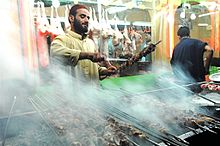
Other popular kebabs include the lamb chop, ribs, kofta (ground beef) and chicken.
Chapli kebab, a specialty of Eastern Afghanistan, is a patty of beef mince. It is a popular barbecue meal in both Pakistan and Afghanistan. It is prepared flat and round and served with naan. The original recipe of chapli kebab dictates a half meat, half flour mixture, which renders it lighter in taste and less expensive.
Chicken[]
Afghani chicken or Murgh Afghani is a classic example of one of the most famous dishes of Afghanistan. Chicken dishes are usually found in restaurants and outdoor street vendor stalls. Unlike the Indian cooking style, chicken in Afghan cuisine is often used in order to be halal. Cream, butter, and curd are customary ingredients in all chicken recipes, whether served as an appetizer or as a main course.
Quroot[]
Quroot (or Qoroot) is a reconstituted dairy product, traditionally a by-product of butter made from sheep or goat milk. The residual buttermilk remaining after butter churning is soured further by keeping it at room temperature for a few days, treated with salt, and then boiling it eventually. The precipitated casein is filtered through cheesecloth, pressed in order to remove liquid, and then shaped into balls. The product is thus a very sour cottage cheese. Quroot is hard and can also be eaten raw. It is typically served with cooked Afghan dishes such as Ashak, Mantu, and Kichri Qoroot.
Other Afghan food items[]



- Afghan Kofta (meatball)[citation needed]
- (sweet pumpkins)
- Afghan salad
- Afghani burger
- Ashak (vegetable and chive-filled dumplings topped with tomato and yogurt sauces)
- Aush (hand-made noodles)
- Bichak (small turnovers with various fillings, including potato and herbs, or ground meat)
- Shorba (Afghan soup similar to borscht)
- Dolma (stuffed grape leaves)
- Londi, or gusht-e-qaaq (spiced jerky)
- Kichri (sticky medium-grain rice cooked with mung beans and onions)
- Badenjan (cooked eggplant with potatoes and tomatoes)
- Badenjan-Burani (fried slices of eggplant, topped with a garlic sour cream sauce and sprinkled with dried mint)
- Baamiyah (okra)
- Bolani also called “Buregian” in southern Afghanistan (somewhat similar to a Quesadilla)
- /Nan-e-Tandoori (Afghan bread cooked in a vertical ground clay oven or a tandoor)
- Nan-e-Tawagy (flatbread cooked on a flat pan)
- (stuffed onion)
- Mantu (meat dumplings), usually served under a yogurt-based white sauce.
- Qabili Palau (traditional rice dish)
- Dampukht (steamed rice)
- Bonjan Salad (spicy eggplant salad)
- Shor-Nakhud (chickpeas with special toppings)
- Nan (a type of flat-bread cooked in an oven made from a hole in the ground. The bread is slapped onto a stone wall to cook)
- Maast or labanyat (type of plain yogurt)
- Chakida or chakka (type of sour cream)
- Salata (tomato and onion-based salad, often incorporating cucumber)
- Sheer Berinj (rice pudding)
- Cream roll (pastry)
- Baklava (pastry)
- Afghan Cake (similar to pound cake, sometimes with real fruit or jelly inside)
- Gosh e feel (thin, fried pastries covered in powdered sugar and ground pistachios)
- Kebab (similar to Middle Eastern style)
- Fernea Pashto/Persian: فر نی], sometimes spelled feereny (milk and cornstarch help make this very sweet, similar to rice pudding without the rice)
- Mou-rubba (fruit sauce, sugar syrup and fruits, apple, sour cherry, or various berries, or made with dried fruits. "Afghan favorite is the Alu-Bakhara".)
- Kulcha/Koloocheh (variety of cookies, baked in clay ovens with charcoal)
- Narenge Palau (dried sweet orange peel and green raisins with a variety of nuts, mixed with yellow rice glazed with light sugar syrup)
- Nargis kabob (egg-based angel hair pasta soaked in sugar syrup, wrapped around a piece of meat)
- Torshi (eggplant and carrot mixed with other herbs and spices, pickled in vinegar and aged)
- Khoujoor[4] (Afghan pastry, deep-fried, oval shaped, similar to doughnuts in taste)
- Afghan Chatni[5] made with fresh Coriander leaves
- Kalah Chuquki or Kalah Gunjeshk (battered deep-fried bird heads)
- Kalah Pacha (lamb or beef head/feet cooked in a broth, served in bowls as a soup dish or in a stew or curry)
- Shami kabob (cooked beef blended with spices, flour and eggs, rolled in hot dog shapes or flat round shapes and fried)
- Shorwa-E-Tarkari[6] (meat and vegetable soup)
- Chopan [Pashto/Persian: چوپان, meaning "shepherd"] kabob [Pashto/Persian: کباب] (lamb chops, skewered and grilled on charcoal)
- Delda or Oagra (mainly a Southern dish, made from the main ingredient of split wheat and a variety of beans mixed)
- Owmach (made from flour; a soup-like dish, very thick and pasty)
- Peyawa or Eshkana (a soup based on flour, very similar to a gravy, but mixed with chopped onion, potatoes and eggs)
- Aushe Sarka (vinegar-based flat noodle soup, taste very similar to Chinese hot and sour soup)
- Maushawa (mixed beans and tiny meatballs, served in a bowl)
- Sheer khurma, a traditional dessert

Baamiyah (okra), also served for lunch or as a side dish

Afghan lamb kebab with yellow saffron rice
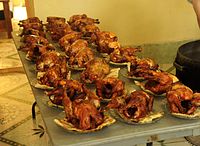
Roasted chicken
Drinks[]
Doogh (also known by some Afghans as shomleh or shlombeh) is a cold drink made by mixing water with yogurt and then adding fresh or dried mint. Some variations of doogh include the addition of crushed or diced cucumber chunks. It is the second most widely consumed drink in Afghanistan (the first being tea), especially during lunchtime in summer. Doogh can be found at almost every Afghan grocery store and is served in restaurants.
By region and ethnicity[]
Pashtun cuisine[]
Pashtuns are the largest ethnic group of Afghanistan, constituting about 42% of the country's total population.[7] A major dish in Pashtun culture is Sohbat, used in traditional gatherings and events.[8][9] Other major Pashtun dishes include lamb-skewered sajji and chapli kebab. The name Dampukht stands for steamed meat, and Khaddi kebab is the Afghan shashlik, which is being grilled on an open fire on a spit.[10]
Pashtun cuisine is meat-heavy and is often offered with caramelized rice, however, it differs from region to region. For example, the dish known as “Bolani” in the north and east is often called “Borogyen” in the south and west of Afghanistan.
Common summer beverages include Shlombeh, also known in Persian as Doogh, a drink consisting of liquid yogurt, mint, and bedreng (Afghan cucumber). Sherbet is an ice-sugared cold drink. Sheer yakh is a sweet ice-like product literally translating to "Cold Milk".[10]
Hazara cuisine[]
The Hazara people in central Afghanistan (in the region of Hazarajat) and western Pakistan (Balochistan province) have their own food – Hazaragi cuisine. Since the Hazara people share some similarities with neighboring regional cuisines, the food is mainly influenced by Central Asian, Persian, and South Asian cuisines. However, the methods of cooking are different in some of the dishes between these neighboring cuisines.
Special occasions[]
Serving tea and white sugared almonds (called nuql) is customary during Afghan festivals.[1][11] Eid-e-Qorban is celebrated at the end of the Hajj, the pilgrimage to Mecca, when families and friends come to visit each other to drink a cup of tea together and share some nuts, sweets, and sugared almonds called noql.
See also[]
References[]
- ^ Jump up to: a b c Brittin, Helen (2011). The Food and Culture Around the World Handbook. Boston: Prentice Hall. pp. 20–21.
- ^ "Rare Heirloom Seeds – Baker Creek Heirloom Seeds". Baker Creek Heirloom Seeds. Archived from the original on 2016-03-04. Retrieved 2013-10-28.
- ^ Jump up to: a b Ali, Tanveer (31 July 2012). "Everything You Need To Know About Afghan Food". foodrepublic. Retrieved 2014-02-19.
- ^ Chef », This. "Khajoor | Afghan Kitchen Recipes".
- ^ "Afghan Chatni made with fresh cilantro leaves, « WATAN CHAT". March 12, 2017.
- ^ Chef », This. "Shorwa-E-Tarkari (Meat & Veg Soup) | Afghan Kitchen Recipes".
- ^ "The Ethnic Groups Of Afghanistan". WorldAtlas.
- ^ "Sohbat: The Pashtun Dish That Brings People Together". www.gounesco.com.
- ^ ayesha.ibrahim (2016-08-05). "Sohbat: The Pashtun Dish That Brings People Together". Make Heritage Fun!. Retrieved 2021-08-18.
- ^ Jump up to: a b Safia Haleem (1 May 2013). Pakistan – Culture Smart!: The Essential Guide to Customs & Culture. Kuperard. pp. 98–. ISBN 978-1-85733-678-8.
- ^ "Afghan Cookbook". afghancookbook.tumblr.com.
Further reading[]
- Helen J. Saberi (1997). "Travel and Food in Afghanistan". In Harlan Walker (ed.). Food on the Move: Proceedings of the Oxford Symposium on Food and Cookery, 1996. Prospect Books. ISBN 978-0-907325-79-6.
| Wikimedia Commons has media related to Cuisine of Afghanistan. |
- Afghan cuisine
- Pashtun cuisine
- Uzbekistani cuisine
- Tajik cuisine




